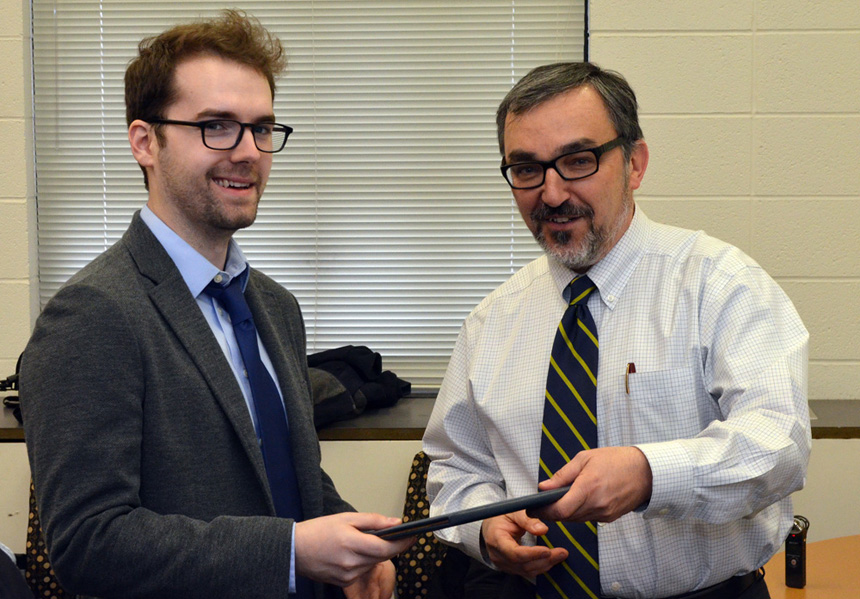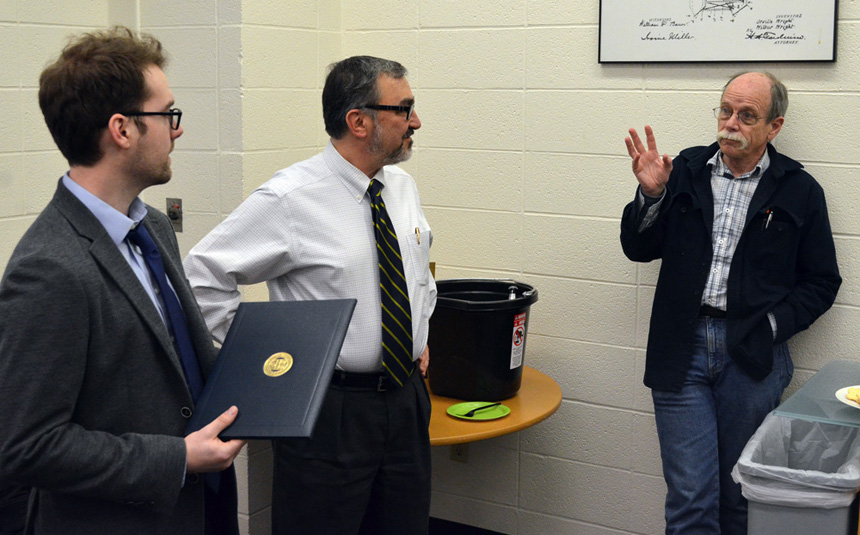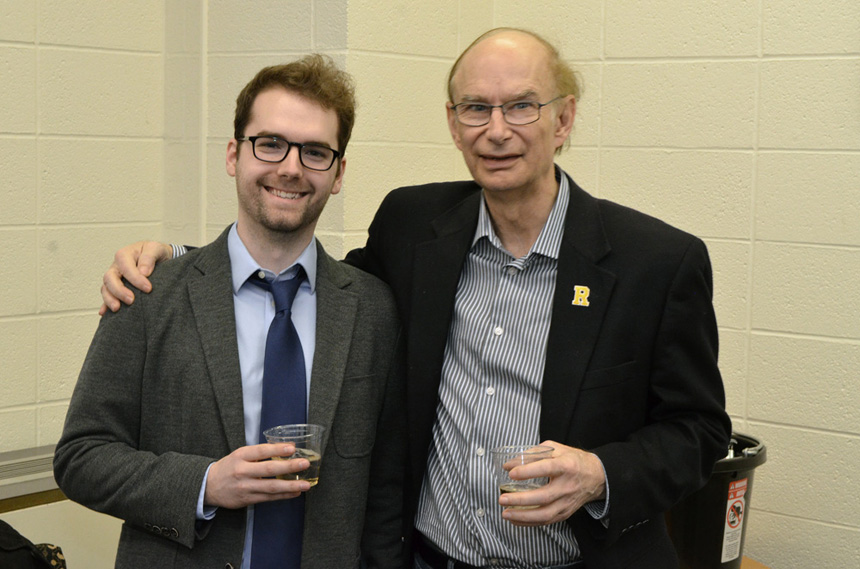PhD student rises to the challenge, teaches a course at short notice
Michael Skarlinski wins Curtis award for teaching by a graduate student

John Lambropoulos, Chair of the Department of Mechanical Engineering, presents Michael Skarlinski with the Edward Peck Curtis Award for Excellence in Teaching by a Graduate Student.
It’s one thing to be a teaching assistant. It’s something altogether different to get a call two weeks into the class saying you’re going to have to take over teaching it the rest of the semester.
Michael Skarlinski, a PhD student in Materials Science, not only accepted that challenge last fall, but handled it so well he has been awarded the University’s Edward Peck Curtis Award for Excellence in Teaching by a Graduate Student.
Skarlinski “demonstrated rare teaching skills in a large class, with very little time to prepare, combining knowledge in his subject, connectedness with the students, with clear caring and devotion to his teaching this class,” wrote John Lambropoulos, Chair of the Department of Mechanical Engineering, in his nomination letter.
“You did a tremendous job,” he reiterated when he presented the award at an informal department ceremony this week, held immediately after Skarlinski successfully defended his PhD thesis.
Skarlinski’s success in connecting with the 72 students in the class was reflected in the comments they wrote afterwards, including:
“He was a phenomenal teacher” . . . “one of the best professors I’ve had yet” . . . “responded super quick to emails” . . . “demonstrated more respect and understanding for students and their needs than many other veteran professors.”
Perhaps the ultimate compliment was paid by a student who was so impressed with what he learned in the class, that he decided to devote more time to Materials Science and asked to work this summer in the lab of Prof. David Quesnel, Skarlinski’s PhD advisor.
Skarlinski had served as a teaching assistant for the class three times before, as well as for other classes in the Department of Mechanical Engineering.
Nonetheless, actually teaching the class, at least initially, was “very overwhelming and would have been a lot more overwhelming had it not been for the other MechE faculty,” Skarlinski said. “Administratively I got a ton of support.”
He admitted to being “very nervous” the first four classes he taught. “But once you start doing it and break the ice, it gets easier. By the end of the semester I was super comfortable, mostly because I knew the students better.”
This was his first “leadership role,” Skarlinski added, and it improved not only his leadership and delegating skills but also his public speaking. “It ended up being a good experience for me.”
Skarlinski graduated magna cum laude with a bachelor’s degree in mechanical engineering from the department in 2011, then earned a master’s in Materials Science the following year. His PhD research involved modeling mechanical and electrochemical properties of nano-structured metals.
After two months with Data Incubator, a halfway house for data scientists transitioning from academia to industry, Skarlinksi recently began working as a consultant for Schireson Associates in New York City, applying many of the same computational tools he used in his PhD work. Schireson assists a range of corporate clients in analyzing data.
“It’s a great position,” Skarlinski said. “My short-term goal is to do well there and just follow the path wherever it goes.”
He will have plenty of supporters in the Department of Mechanical Engineering, wishing him well as he follows that path.
“The very best to you,” Lambropoulos said, as glasses were raised in a toast to Skarlinksi at the ceremony. “You’ve left a lot of very fond memories for our staff and our faculty. You have impressed a lot of people.”
 Emeritus Prof. Roger Gans, at right, praised Skarlinski as “one of the top three students I ever had in ME 241. That experimental group that you lead did things at a level that is extremely rare in that course.” Below, Skarlinksi with Prof. David Quesnel, his PhD advisor.
Emeritus Prof. Roger Gans, at right, praised Skarlinski as “one of the top three students I ever had in ME 241. That experimental group that you lead did things at a level that is extremely rare in that course.” Below, Skarlinksi with Prof. David Quesnel, his PhD advisor.

